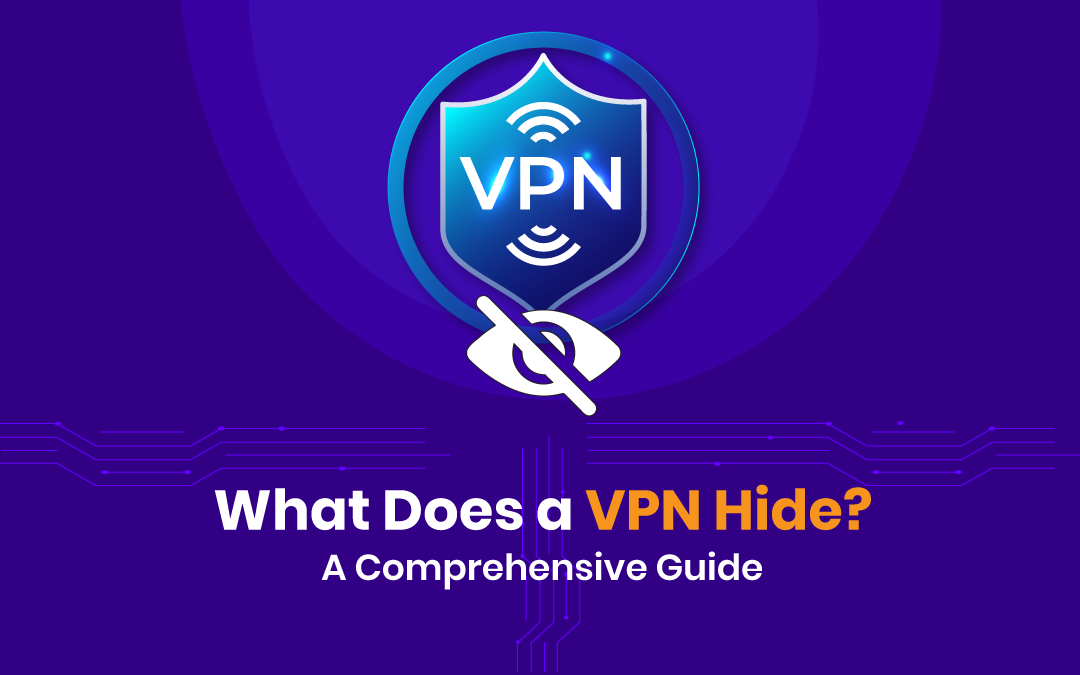
In today’s digital world, privacy is becoming more crucial than ever. With hackers, advertisers, and even governments constantly monitoring online activity, it’s no surprise that VPNs (Virtual Private Networks) are growing in popularity. If you’re wondering, “What does a VPN hide?”, this guide will help you understand how a VPN works and what it can conceal from prying eyes.
What is a VPN?
Before diving into what a VPN hides, it’s important to understand what a VPN is. A VPN is a tool that creates a secure, encrypted tunnel between your device and the internet. By routing your internet traffic through this tunnel, a VPN ensures that your data is protected, making it difficult for anyone to monitor or track your online activity.
What Does a VPN Hide?
Let’s break down the various aspects of your online activity that a VPN can hide:
1. IP Address
Your IP address is like your digital fingerprint. It identifies your location and the device you're using. A VPN masks your real IP address by assigning you a new one, typically from a different location. This makes it appear as though you’re browsing from a different country, effectively hiding your true location.
Why It Matters: Hiding your IP address can prevent websites from tracking your location, protecting your privacy and allowing access to geo-restricted content.
2. Browsing History
Without a VPN, your Internet Service Provider (ISP) can see every website you visit and log your browsing history. With a VPN, your traffic is encrypted, which means your ISP (and anyone else) can’t monitor the specific websites you visit.
Why It Matters: This helps protect your personal privacy, prevents ISPs from selling your data, and ensures that advertisers can’t target you based on your browsing habits.
3. Online Activity
A VPN hides not just the websites you visit, but also your activities on those sites. Whether you're streaming videos, shopping online, or using social media, a VPN ensures that your activities are encrypted and hidden from outside observers.
Why It Matters: Hackers or malicious actors who might try to intercept your data won’t be able to see what you're doing or steal your personal information.
4. Location-Based Tracking
Many websites and apps use GPS data or other tracking methods to pinpoint your location. A VPN hides your real location by redirecting your traffic through servers in a different region or country.
Why It Matters: By masking your location, you can avoid targeted ads, bypass censorship, and even access content that is restricted in your region.
5. Personal Data on Public Wi-Fi
Public Wi-Fi networks, such as those in coffee shops or airports, are notorious for being unsafe. A VPN encrypts your data on these networks, ensuring that anyone on the same network can’t see what you’re doing.
Why It Matters: This prevents hackers from stealing your personal information, such as credit card numbers or passwords, while you’re using a public Wi-Fi connection.
What a VPN Doesn’t Hide
While VPNs offer significant privacy protection, they’re not a cure-all. Here are a few things a VPN won’t hide:
1. Your Actions on Websites
While a VPN hides your traffic from external observers, it doesn’t make you invisible on the websites you visit. If you’re logged into services like Google or Facebook, they can still track your actions on their platforms.
2. Cookies and Trackers
A VPN can’t stop websites from using cookies or other trackers to monitor your behavior. To enhance your privacy, you may need to use browser extensions or privacy-focused browsers.
3. Legal Authority Requests
If a government agency issues a legal request for information, some VPNs may be required to provide logs, depending on their jurisdiction and logging policies. Choosing a no-logs VPN can help mitigate this risk.
Why Should You Use a VPN?
A VPN provides numerous benefits, especially if you’re concerned about online privacy and security. Here are the top reasons to consider using a VPN:
1. Bypass Censorship
In countries with strict internet censorship, a VPN allows users to access websites and content that would otherwise be blocked.
2. Avoid Tracking
Whether you’re concerned about advertisers, hackers, or government surveillance, a VPN can help you avoid being tracked online.
3. Secure Your Data on Public Networks
If you frequently use public Wi-Fi, a VPN is essential for securing your data from potential cyberattacks.
Final Thoughts: What Does a VPN Hide?
A VPN hides your IP address, browsing history, and online activities, protecting your privacy and security. While it won’t make you completely anonymous online, it’s a powerful tool to help shield your data from prying eyes.
If you value your online privacy, a VPN is an essential tool to have in your digital security arsenal. Always ensure to choose a VPN provider that offers strong encryption, a no-logs policy, and the ability to mask your location effectively.
 FAQs
FAQs
Yes, a VPN can hide your browsing from your employer, as long as you’re not using a work-provided device or network. It encrypts your traffic, making it unreadable to your employer.
No, a VPN can’t make you completely anonymous, but it does significantly enhance your privacy by hiding your IP address and encrypting your data.
In most countries, using a VPN is perfectly legal. However, some countries have restrictions, so always check the laws in your region.
A VPN can sometimes slow down your internet speed due to the encryption process and the distance to the server you’re connected to. However, many premium VPNs offer high-speed connections that minimize any noticeable slowdown.
Share this post
Leave a comment
All comments are moderated. Spammy and bot submitted comments are deleted. Please submit the comments that are helpful to others, and we'll approve your comments. A comment that includes outbound link will only be approved if the content is relevant to the topic, and has some value to our readers.

Comments (0)
No comment